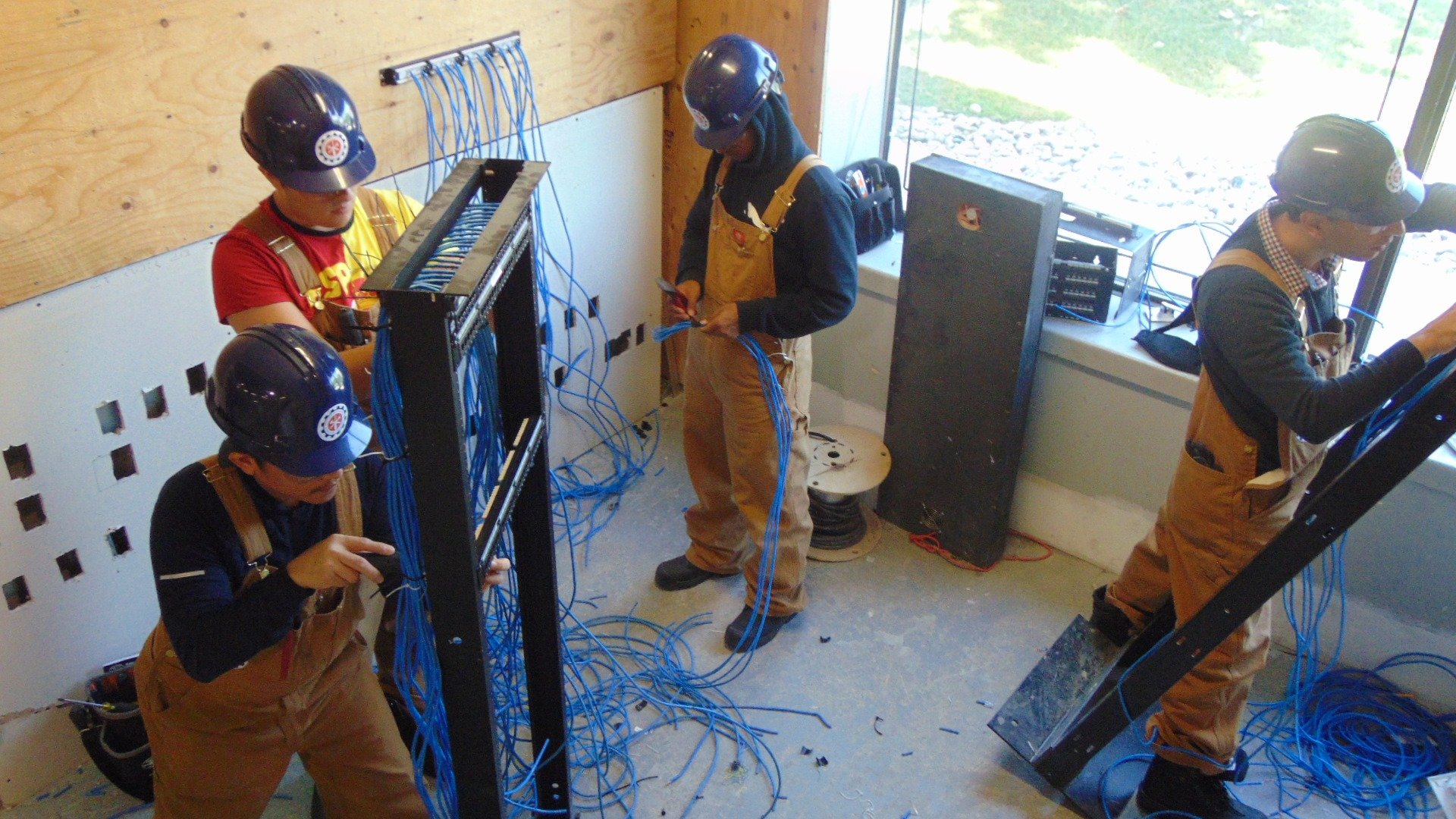Updated December 2025
Most of us take for granted that our phones, TVs, and computers connect to some sort of network. We hardly think about the people and technology that make those networks function.
We don't truly understand what goes into setting up, maintaining, and repairing the telecommunications infrastructure we rely on every single day.
This is the world of network cabling. Professionals in this field take special training to learn how to install, troubleshoot, and maintain the structured cabling systems that transmit data, voice, and video.
Thinking of starting a career in this industry?
You probably have some questions about network cabling training, like what skills you'll learn and what jobs you can get after graduation.
That's exactly what we're covering in today's post. Get a good overview of this program, find out what to expect, and see if network cabling is right for you.
WHAT DOES NETWORK CABLING TRAINING teach?
A structured cabling course teaches students how to set up and maintain lines for telephone, Internet, cable, and satellite services.
You'll study basic electrical theory, learn how signals are generated and transmitted, and explore the differences between copper and fibre cables.
Network cabling training really focuses on practical skills. Students learn how to:
☑️ Follow network diagrams, blueprints, and specifications
☑️ Work with single line, coaxial, and fibre optic cables
☑️ Choose the appropriate type of cable for each situation
☑️ Pull, route, and mount cables in a building
☑️ Use diagnostic equipment to test cables
☑️ Strip, terminate, and trim cables
☑️ Install jacks and wall plates
☑️ Troubleshoot cable systems
☑️ Choose wiring closets
☑️ Perform site surveys
☑️ Create bid proposals
☑️ Calculate estimates
☑️ Stay safe on the job
Simulations and Hands-on Networking Projects
Any good network cabling training includes extensive practice in a workshop. Students should be working with real cabling tools and equipment, doing installations, and learning how to solve real-world networking problems.
So, your program will have two main parts. You will spend part of your time in a classroom learning theory. And the rest of the time, you'll be in a workshop doing simulations and working on networking projects.
For example, at Herzing College we partnered with Transglobal Systems of Canada (TSOC). They are a top manufacturer and supplier of telecommunications equipment.
TSOC supplies our network cabling students with all the cables, connectors, patch panels, electrical accessories, and other products they need to do simulations in the workshop.
This is a really important part of network cabling training. In the workshop, you'll learn the skills and techniques employers are looking for.
HOW LONG IS NETWORK CABLING TRAINING?
Network cabling training is relatively short. There are courses you can complete in just 24 weeks.
So even if you're a total beginner, you can build the skills you need to get started in this trade in only six months.
WHAT JOBS CAN YOU GET AFTER NETWORK CABLING TRAINING?
Once you complete your network cabling training, you can become a:
☑️ Network cabling specialist
☑️ CATV technician
☑️ Telecommunications contractor
☑️ Fibre optic technician
☑️ IT technician
And you can find work with many different types of organizations. Possible employers include:
☑️ Network installation companies
☑️ Telecommunications carriers
☑️ Internet service providers
☑️ Data centres
☑️ IT firms and electrical product companies
☑️ Construction companies
DO NETWORK CABLE TECHNICIANS HAVE TO BE CERTIFIED?
No. Skilled Trades Ontario calls network cabling specialist a voluntary trade, not a compulsory one. That means certification is available, but it's not required.
If you choose to earn your Certificate of Qualification as a network cabling specialist, you must complete an apprenticeship that includes:
☑️ 600 hours of classroom lessons
☑️ 4,000 hours of on-the-job training
Once you have accumulated all those hours, you must pass a certification exam.
The whole process takes about 2.5 years. But that's fairly quick compared to the process of becoming a plumber or electrician, which takes roughly five years.
Remember: You don't need to go through all that. You can become a fully qualified network cable technician just by completing the 24-week program.
However, certification can help you stand out when applying for network cabling jobs. Some companies prefer to hire candidates who have been certified.
CAN NETWORK CABLING TRAINING BE COMBINED WITH ANOTHER TRADE?
Yes! Some colleges offer combined electrician and network cabling training.
Those two trades go together naturally. By combining them, you can learn how to install and fix electrical wiring, fixtures, and control devices along with communication networks.
That gives you many more job options after graduation.
Once you complete the combined training, you could:
☑️ Go straight to work as a network cable technician
☑️ Begin a network cabling apprenticeship to become certified
☑️ Start an electrician apprenticeshipWANT TO LEARN MORE ABOUT NETWORK CABLING TRAINING?
Have a look at the Network Cabling Technician program at Herzing College. It's just 24 weeks long and is taught by expert instructors with years of telecommunications experience.
The training also includes key safety certifications like lockout and tag safety, working at heights, and confined spaces hazard awareness.
Still have questions? Your best bet is to talk to admissions. An advisor can answer all your questions about the training and help you figure out if this trade is right for you.
Click below to explore the program and chat live with an advisor. We're here to help!






